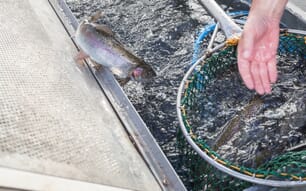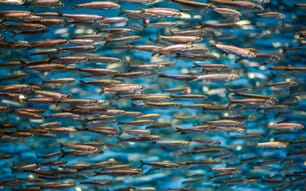This is good news for fish feed manufacturers looking for plant-based ingredients high enough in protein to meet the dietary needs of fish. The ARS-MMP-patented technology is being applied at a commercial prototype plant built specifically to produce protein barley for use in rainbow trout feeding trials. A product may soon be available.
"A fish feed ingredient needs to include 40 to 60 per cent protein for carnivorous fish like rainbow trout," says ARS fish physiologist Rick Barrows, based in Bozeman, Montana. "Barley feed grain typically contains about 10 to 12 per cent protein."
The new process concentrates the protein in barley by removing the carbohydrates from the grain.
The protein is not exposed to high temperatures during concentration, which makes digestibility of protein very high. Scientists found that protein digestibility and amino acids' availability was in the mid-90 per cent range.
Sampling Salmon
Atlantic salmon also have a taste for barley. Scientists at the ARS National Cold Water Marine Aquaculture Center (NCWMAC) in Franklin, Maine, evaluated the growth effects in fish fed diets containing barley protein.
"Feed manufacturers are looking for additional ingredients to use in feed," says NCWMAC fish physiologist Gary Burr. "The cost of fishmeal is relatively high. If you can process plant meal, you're getting higher protein levels that are similar to fishmeal at a similar cost."
In a study, scientists compared the results of salmon that were fed a diet containing either 11 per cent or 22 per cent barley protein concentrate and a standard commercial fishmeal diet. They found no significant differences in growth among the three different diets, demonstrating that barley protein concentrate is a suitable feed ingredient for salmon.
"Barley protein offers an alternative to more expensive available sources like fishmeal and soy protein concentrate," Mr Barrows said. "This is also evident in a collaborative study with the University of Stirling in Scotland, which substantiates that barley protein is a nutritious feed ingredient for salmon."
Preparing a Product
MMP plans to build a commercial facility to produce a barley protein product after evaluating results from its testing program at the prototype plant.
As aquaculture continues to grow at a rapid rate, the demand for high-protein ingredients continues to increase, says MMP's Clifford Bradley. The market for this type of barley product is huge.
Typically, high-protein ingredients are selling at about $1,200 or more a ton, while fishmeal is about $1,600 a ton, he says. Besides being less expensive, barley protein concentrate offers other benefits.
For example, "the phosphorus from bones and fins in fishmeal is not very digestible. Most of it goes into the water as a pollutant," Mr Bradley says. "Barley protein has much less phosphorus, which is more digestible and is utilized by the fish."
Barley protein concentrate provides another source for feed manufacturers, reduces cost and gives farmers an alternative to fishmeal. It also creates additional markets for small-grain growers, Barrows says. The process used to produce the feed ingredient is perfect for malting barley that is too high in protein to sell to beer companies.
"We're trying to develop plant-based ingredients for fish so we don't have to rely on fishmeal from the ocean," he says.
Plant-based alternative feed is not only good for the environment but also good for consumers. Producing more fish with less costly sustainable ingredients provides a safe and nutritious food source.




